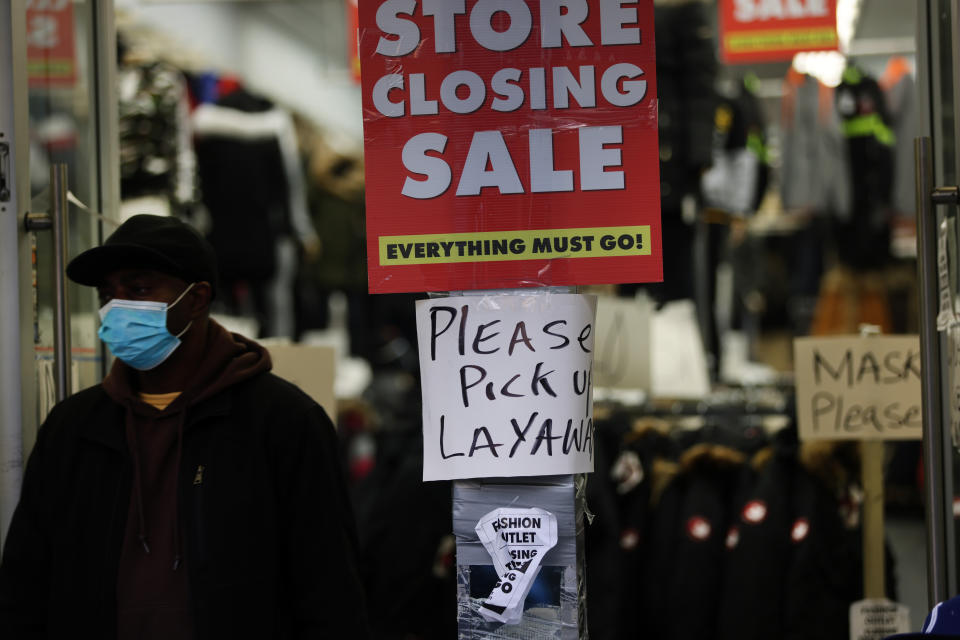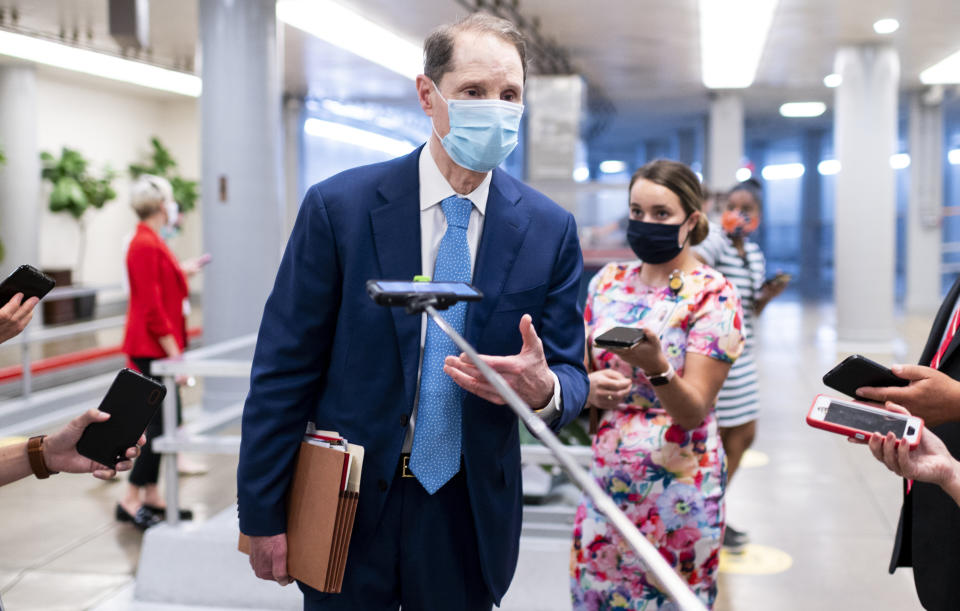As Economy Sheds Jobs, Democrats Eye Next Cutoff For Unemployment Benefits
Employers in the U.S. shed 140,000 jobs in December — the first monthly job loss since April thanks to a pandemic that is worse than ever.
The economy is about to get a shot in the arm due to a COVID-19 relief bill Congress passed late last month. Businesses will soon be eligible for another round of forgivable loans from the Paycheck Protection Program, most households will get direct payments worth $600 per person, and unemployed workers get an extra $300 per week.
However, Congress set federal unemployment benefits to start expiring in March — and it’s unlikely the situation will have improved enough, or that enough Americans will have been vaccinated, for all workers to return to their jobs.
“The December jobs decline shows the economy is struggling to avoid a double-dip recession, and the only reason it likely won’t is the recently passed $900 billion fiscal relief package and the additional relief that is coming with the new Biden administration,” Mark Zandi, chief economist at Moody’s Analytics, said in an email.

President-elect Joe Biden and congressional Democrats, who will soon have majorities in both the House and Senate, have said they would pass a bill providing $2,000 direct payments to households, something outgoing President Donald Trump and even some Republicans in Congress have championed.
But Democrats also want to prioritize continuing extra federal unemployment benefits, which is a proposal Republicans will likely oppose.
Democrats believe they may be able to push through the unemployment benefits with the $2,000 checks by using a process called budget reconciliation, a wonky procedure that allows Senate Democrats to pass some legislation with only 51 votes.
But it’s not clear whether Biden supports using reconciliation, which technically can be used only once per year. He supports extra unemployment benefits, but after Democrats won control of the Senate with their victories in Georgia, the president-elect issued a statement calling for the next relief bill to be bipartisan. Budget reconciliation and bipartisanship generally don’t mix. Biden’s team did not respond to a request for comment.
The December jobs decline shows the economy is struggling to avoid a double-dip recession. Mark Zandi, chief economist at Moody’s Analytics
Republican senators have made it very clear that they are done extending the jobless benefits. So much so that in the last relief package they insisted the current unemployment insurance be phased out slowly over the course of a month, instead of all at once. The extra $300 stops on March 14, but workers already receiving benefits from federal programs for gig workers and the long-term jobless can continue until the week of April 5.
Without a harsh cutoff to worry about, Republicans were hoping there would be less pressure to act so December’s extension would be the last round of funding for unemployment insurance.
Democrats have a different idea, however. Sen. Ron Wyden (D-Ore.), who was key in negotiating the first round of unemployment benefits passed in March — which gave $600 per week to the jobless for four months — wants to tie the program to the economy.
“My starting point here is going to be my legislation that would reinstate the full $600 weekly and tie additional weeks of benefits and the program for gig workers to economic conditions,” Wyden said in a statement to HuffPost. “There’s so much work to do, and the Senate can’t be revisiting economic relief every two or three months. Robust jobless benefits paired with additional relief payments will help millions of struggling families survive until the end of this crisis.”
Wyden has a proposal with Democratic Sens. Sherrod Brown (Ohio), Michael Bennet (Colo.), Chuck Schumer (N.Y.) and Jack Reed (R.I.) that would retroactively extend benefits of $600 per week through October 2021, and ensure Americans can continue to receive benefits as long as the three-month unemployment figures are above 5.5%.
Democrats — who have only 50 votes in the Senate and Vice President-elect Kamala Harris as the tie-breaking vote — could avoid having to whittle down their proposal in order to win over nine Republicans by going through the budget reconciliation process.

There are some Republicans more open to COVID-19 relief, including Sens. Susan Collins (R-Maine), Bill Cassidy (R-La.) and Lisa Murkowski (R-Alaska), who worked with Democrats on an early version of the aid package that just passed. But there’s very little appetite among Republican leadership and the broader caucus. Failing to pass additional relief could leave millions of unemployed Americans in the lurch come March.
The coronavirus crisis reached its worst levels this week. States and localities struggle to handle a serious surge of COVID-19 hospitalizations and are seeing record-high death tolls. Hopes of widespread vaccination also seems unlikely by March, making it highly unlikely that the economy will be back to how it was before the pandemic.
Zandi said the economy will probably need more help. “More supplemental unemployment insurance, another round of stimulus checks and more PPP funds for small businesses will almost surely be needed to ensure there is enough aid until mid-year when the pandemic will likely hopefully be fading as more Americans are vaccinated,” he said.
The situation is particularly challenging for workers whose jobs involve face-to-face interactions with customers. December’s net job loss was driven by nearly 500,000 layoffs in the hospitality industry, and many of those jobs can’t come back until the weather is warm and the pandemic is contained.
Marc Goldwein, an economist and budget expert with the Committee for a Responsible Federal Budget, said winter will be difficult regardless of what Congress does, but that the recent spending bill will help a lot later this year.
“If its macro effect coincides with weather starting to warm and the virus spread declining, we could see a big burst in economic activity starting in March and getting especially strong into the summer,” Goldwein said in an email.
Wyden has said he wants a more significant reform of the state-federal unemployment system. If Congress doesn’t take action, states will ― and the recession could have long-term consequences for unemployed workers.
State unemployment benefits are backed by trust funds that have been depleted by pandemic job losses, prompting states to borrow from the federal government, and the need to pay that money back can trigger automatic payroll tax increases on businesses. After the Great Recession ended in 2009, several states partially alleviated the business tax burden by permanently cutting benefits. The unemployment system has for decades gotten increasingly less generous.
“It’s very likely there will be lots of benefit reductions,” said Wayne Vroman, an associate at the nonprofit Urban Institute. “They quite often have a financing law that cuts benefits as well as raising taxes. That’s been the pattern in past recessions.”
Related...
With Georgia Wins, These Progressive Policy Dreams *Might* Actually Come True
The Capitol Riot Crystalizes 4 Years Of American Decline
U.S. Loses 140,000 Jobs, First Monthly Loss Since Spring
This article originally appeared on HuffPost and has been updated.

